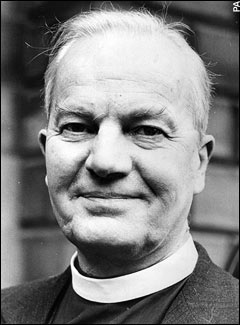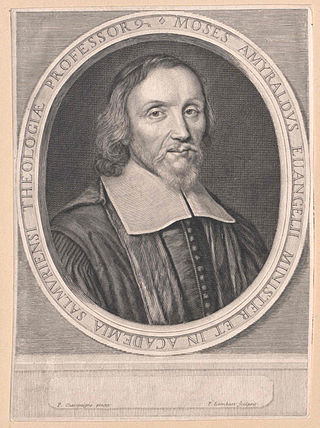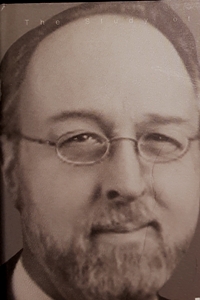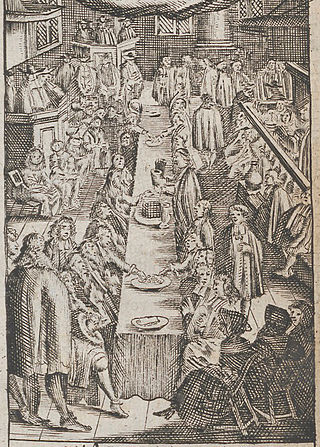
Calvinism is a major branch of Protestantism that follows the theological tradition and forms of Christian practice set down by John Calvin and other Reformation-era theologians. It emphasizes the sovereignty of God and the authority of the Bible.

John Calvin was a French theologian, pastor and reformer in Geneva during the Protestant Reformation. He was a principal figure in the development of the system of Christian theology later called Calvinism, including its doctrines of predestination and of God's absolute sovereignty in the salvation of the human soul from death and eternal damnation. Calvinist doctrines were influenced by and elaborated upon the Augustinian and other Christian traditions. Various Congregational, Reformed and Presbyterian churches, which look to Calvin as the chief expositor of their beliefs, have spread throughout the world.

Predestination is a doctrine in Calvinism dealing with the question of the control that God exercises over the world. In the words of the Westminster Confession of Faith, God "freely and unchangeably ordained whatsoever comes to pass." The second use of the word "predestination" applies this to salvation, and refers to the belief that God appointed the eternal destiny of some to salvation by grace, while leaving the remainder to receive eternal damnation for all their sins, even their original sin. The former is called "unconditional election", and the latter "reprobation". In Calvinism, some people are predestined and effectually called in due time to faith by God, all others are reprobated.

The Institute for Christian Studies is a private, graduate-level Reformed philosophical and theological school in Toronto, Ontario. At ICS, students and faculty take part in shared learning through participatory seminars, mentoring, and an interdisciplinary approach to study. There are several unrelated institutions bearing similar names.

Nicholas Paul Wolterstorff is an American philosopher and theologian. He is currently Noah Porter Professor Emeritus Philosophical Theology at Yale University. A prolific writer with wide-ranging philosophical and theological interests, he has written books on aesthetics, epistemology, political philosophy, philosophy of religion, metaphysics, and philosophy of education. In Faith and Rationality, Wolterstorff, Alvin Plantinga, and William Alston developed and expanded upon a view of religious epistemology that has come to be known as Reformed epistemology. He also helped to establish the journal Faith and Philosophy and the Society of Christian Philosophers.
Calvin Theological Seminary is a private Christian Reformed Church seminary in Grand Rapids, Michigan. It is closely tied to Calvin University, though each institution has its own board.

Thomas Forsyth Torrance, commonly referred to as T. F. Torrance, was a Scottish Protestant theologian and minister. Torrance served for 27 years as professor of Christian dogmatics at New College, in the University of Edinburgh. He is best known for his pioneering work in the study of science and theology, but he is equally respected for his work in systematic theology. While he wrote many books and articles advancing his own study of theology, he also edited the translation of several hundred theological writings into English from other languages, including the English translation of the thirteen-volume, six-million-word Church Dogmatics of Swiss theologian Karl Barth, as well as John Calvin's New Testament Commentaries. He was a member of the famed Torrance family of theologians.

Amyraldism is a Calvinist doctrine. It is also known as the School of Saumur, post redemptionism, moderate Calvinism, or hypothetical universalism. It is one of several hypothetical universalist systems.

The two kingdoms doctrine is a Protestant Christian doctrine that teaches that God is the ruler of the whole world and that he rules in two ways. The doctrine is held by Lutherans and represents the view of some Calvinists. John Calvin significantly modified Martin Luther's original two kingdoms doctrine and certain neo-Calvinists have adopted a different view known as transformationalism.
Robert Scott Clark is an American Reformed pastor and seminary professor. He is the author of several books, including his most recent work, Recovering the Reformed Confession.

James K. A. Smith is a Canadian-American philosopher who is currently Professor of Philosophy at Calvin University, holding the Gary & Henrietta Byker Chair in Applied Reformed Theology & Worldview. He is the current editor-in-chief of the literary journal Image.

Richard B. Gaffin, Jr. is a Calvinist theologian, Presbyterian minister, and was the Charles Krahe Professor of Biblical and Systematic Theology at Westminster Theological Seminary in Philadelphia, Pennsylvania from 1999 to 2008. He became the Professor Emeritus, Biblical and Systematic Theology in 2008.
W. Robert Godfrey is a minister in the United Reformed Churches in North America and formerly served as the third president of Westminster Seminary California. As of 2017 he is president emeritus and professor emeritus of church history. He currently is chairman of Ligonier Ministries, located in Sanford, Florida, a position he took over from the late Dr. R. C. Sproul.

Richard A. Muller is an American historical theologian.
The Post-Reformation Digital Library (PRDL) is a database of digitized books from the early modern era. The collected titles are directly linked to full-text versions of the works in question. The bibliography was initially inclined toward Protestant writers from the Reformation and immediate Post-Reformation era. In its current development the project is moving toward being a comprehensive database of early modern theology and philosophy and also includes late medieval and patristic works printed in the early modern period.
Reformed orthodoxy or Calvinist orthodoxy was an era in the history of Calvinism in the 16th to 18th centuries. Calvinist orthodoxy was paralleled by similar eras in Lutheranism and tridentine Roman Catholicism after the Counter-Reformation. Calvinist scholasticism or Reformed scholasticism was a theological method that gradually developed during the era of Calvinist Orthodoxy.

The theology of John Calvin has been influential in both the development of the system of belief now known as Calvinism and in Protestant thought more generally.

In Reformed theology, baptism is a sacrament signifying the baptized person's union with Christ, or becoming part of Christ and being treated as if they had done everything Christ had. Sacraments, along with preaching of God's word, are means of grace through which God offers Christ to his elect. Sacraments are believed to have their effect through the Holy Spirit, but these effects are only believed to accrue to those who have been predestined to have faith in Christ.

In Reformed theology, the Lord's Supper or Eucharist is a sacrament that spiritually nourishes Christians and strengthens their union with Christ. The outward or physical action of the sacrament is eating bread and drinking wine. Reformed confessions, which are official statements of the beliefs of Reformed churches, teach that Christ's body and blood are really present in the sacrament, and that believers receive, in the words of the Belgic Confession, "the proper and natural body and the proper blood of Christ." The primary difference between the Reformed doctrine and that of Catholic and Lutheran Christians is that for the Reformed, this presence is believed to be communicated in a spiritual manner rather than by his body being physically eaten. The Reformed doctrine of real presence is called "pneumatic presence".
Church music during the Reformation developed during the Protestant Reformation in two schools of thought, the regulative and normative principles of worship, based on reformers John Calvin and Martin Luther. They derived their concepts in response to the Catholic church music, which they found distracting and too ornate. Both principles also pursued use of the native tongue, either alongside or in place of liturgical Latin.














